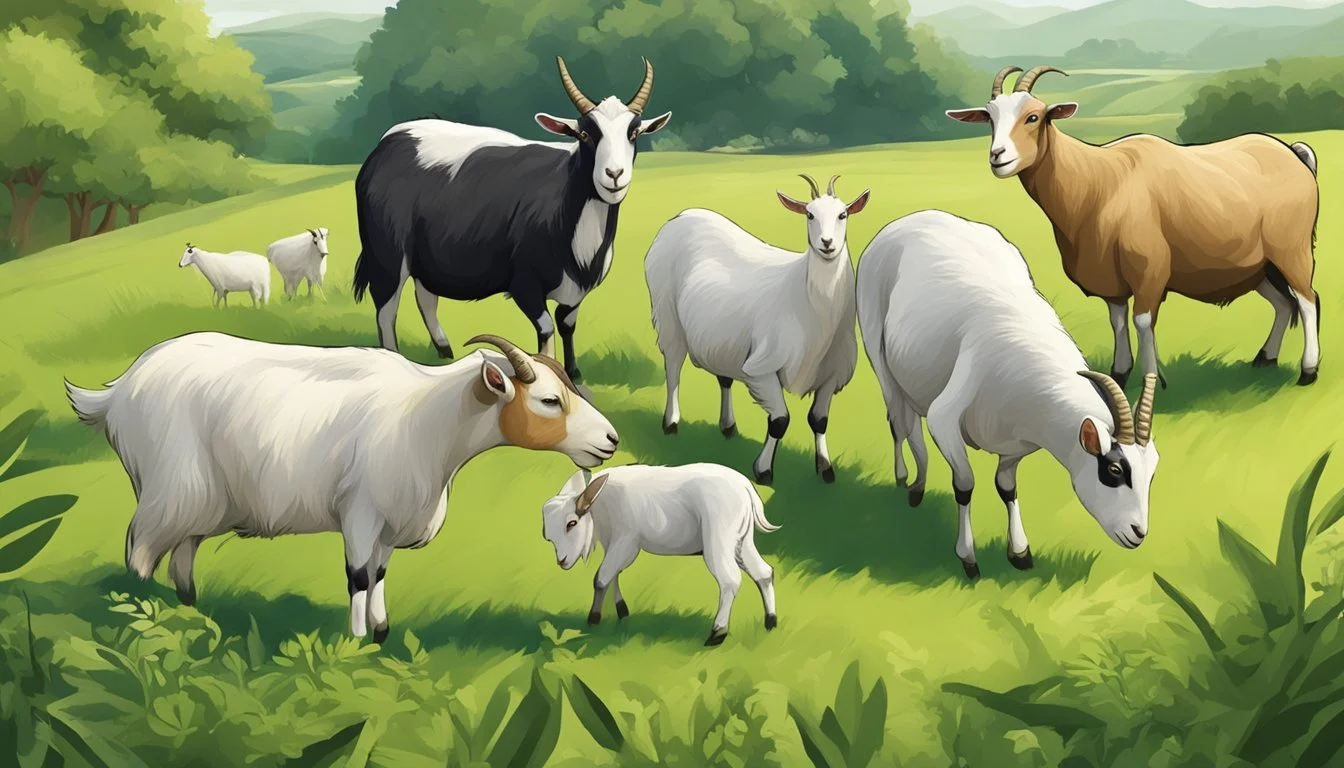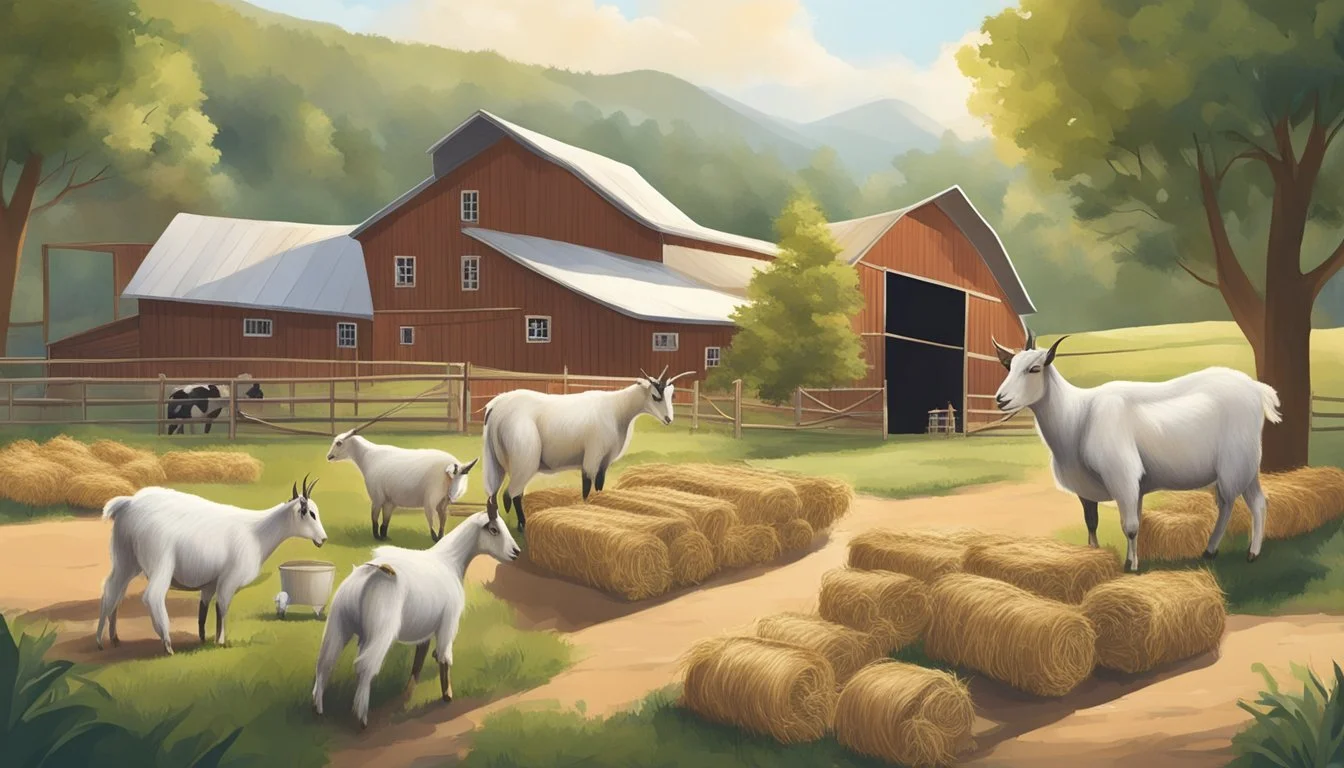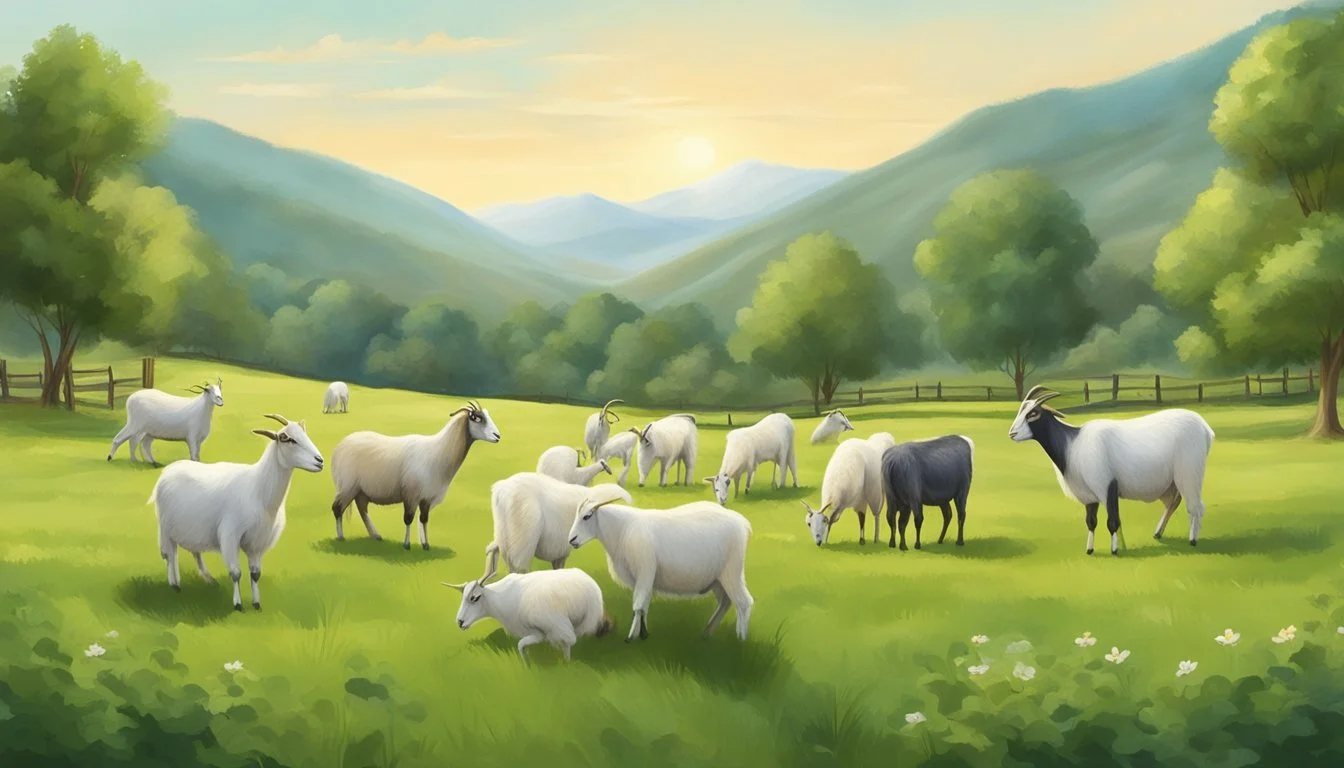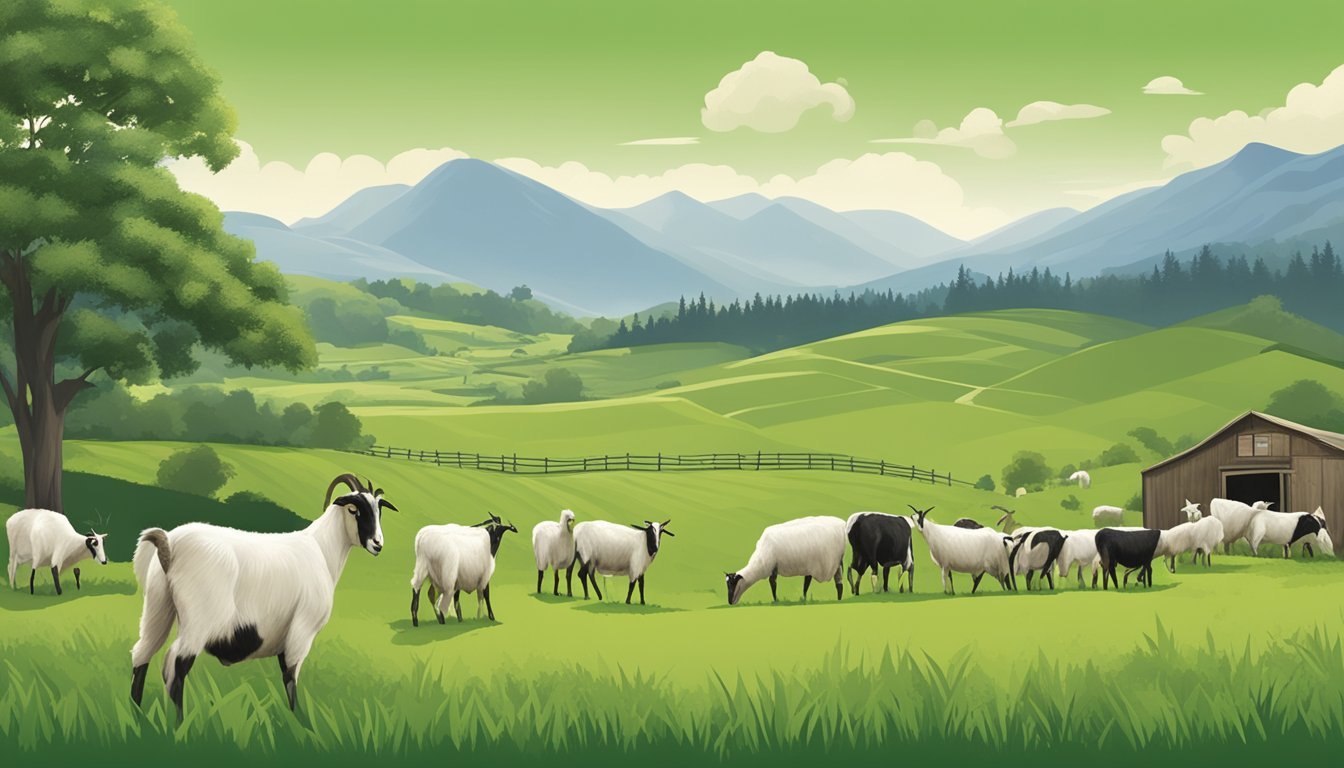Organic Goat Feed Options
Selecting Optimal Nutrition for Your Milking Goat
When raising milking goats, the quality and type of feed play a pivotal role in both the health of the goats and the quality of the goat milk produced. Organic goat feed options have gained popularity among dairy goat farmers due to their absence of synthetic additives and potential for improving herd health. Nutrition is a critical factor, and choosing the right balance of ingredients in the feed influences not only the goats' wellbeing but also the taste and nutritional content of the milk.
Organic feeds, which should meet the USDA's organic standards, generally include a mixture of organic grains, grasses, and legumes. They are formulated to provide the essential nutrients that milking goats require to stay healthy and produce high-quality milk. Probiotics, kelp, and a range of minerals are often added to support digestion and enhance nutrient absorption, ensuring that the goats receive a well-rounded diet.
Transitioning to an organic feeding program requires attention to specific guidelines, such as ensuring that, after a transition period, the dairy goats are receiving 100% organic feed. For dairy goat producers interested in making this switch, holistic management of the herd's diet is crucial. This includes understanding the suitable ratios of feed components, avoiding genetically modified organisms (GMOs), and ensuring that the feed is not only sustaining the goats' health but also raising the standards of the dairy products offered to consumers.
Fundamentals of Goat Nutrition
Proper nutrition is pivotal for maintaining the health and enhancing the milk production capabilities of goats. It requires a deep understanding of their dietary needs, the quality of feed, and the balance of nutrients.
Understanding Goat Dietary Needs
Goats are ruminants and require a diverse range of feedstuffs to meet their nutritional requirements. They require an adequate intake of protein to support growth, maintenance, and lactation. Vitamins and minerals are equally important for their overall health and to prevent deficiencies. Ensuring the right nutrients are available in their diet supports optimal milk production.
The Importance of Feed Quality for Health and Production
High-quality feed is non-negotiable for peak goat health and productivity. Goats fed on poor-quality fodder may face health issues and diminished milk production. It is critical for organic feed to be free from contaminants and rich in essential nutrients to promote health and support lactation needs.
Balancing Macronutrients for Optimal Growth
A proper balance of carbohydrates, proteins, and fats makes up the core of goat nutrition. Carbohydrates are the primary energy source, while proteins are essential for growth and repair, especially during periods of lactation. Fats, although needed in smaller amounts, provide a concentrated energy source and are necessary for the absorption of some vitamins. A diet well-balanced in these macronutrients is key to maintaining healthy goats with high milk production.
Organic Feed Ingredients
Choosing the right ingredients for your milking goat's diet is crucial for their health and milk production. Organic feed options not only support sustainable farming practices but also can lead to better quality milk.
Natural Grains as a Protein Source
Organic grains such as barley and oats are fundamental components in a goat's diet, providing a robust source of protein that is essential for growth and milk production. For instance, Nature's Best Organic Goat Feed includes goat pellets that contain 16% protein, integrating organic grains into a complete food package.
The Role of Forage and Hay in a Goat's Diet
Forage and hay are indispensable in a goat's diet, adding necessary fiber that aids in digestion. Organic alfalfa and other fresh, leafy greens meet the nutritional requirements for goats, while also catering to their natural browsing instincts. It's suggested that goats should have constant access to hay, which promotes their rumen health and overall well-being.
Supplements and Minerals for a Balanced Diet
In addition to natural grains and forage, goats require a certain balance of minerals and vitamins. Supplements such as kelp and brewer's yeast can be mixed into homemade feeds, as described by Falcone Family Farms' homemade organic goat feed mix, to provide essential nutrients. Moreover, organic minerals like those in Reedy Fork Organic Farm’s Organic Goat Feed can further ensure that goats receive all the necessary dietary components for a thriving, healthy life.
Types of Organic Goat Feed
Choosing the right organic feed for milking goats is crucial to their health, productivity, and the quality of milk produced. Organic feeds offer a variety of options tailored to meet nutritional needs without the use of synthetic pesticides and fertilizers.
Pellets vs. Loose Feed Options
Pellets are a compact and convenient form of feed that can provide a complete balanced diet for your goats in a consistent manner. Pellets typically contain a mix of grains such as organic barley, organic oats, and organic wheat, ensuring essential nutrients are included. On the other hand, loose feed options, often referred to as "mash," allow for a more natural feeding experience. Goats can rummage through mixed grains and other components, which can encourage natural foraging behaviors.
Homemade Feed Recipes
For those who prefer a more hands-on approach, a homemade recipe can be tailored to your goats' specific needs. A common mixture includes organic barley, organic oats, and alfalfa pellets, along with a small portion of organic corn to provide energy. To enhance the nutritional value, ingredients like black oil sunflower seeds and kelp may be added. Organic feed recipes put you in control of the quality and variety of the feed your goats consume.
Commercial Organic Feed Brands
For convenience and quality assurance, many opt for commercial organic feed brands that specialize in goat nutrition. These feeds are often Non-GMO Project Verified and use exclusively North American Organic Grains. Example of such a brand is Nature's Best Organic Goat Feed, which offers 16% protein pellets suitable for dairy and meat goats, and New Country Organics provides a certified organic feed balanced with probiotics, kelp, and minerals. These preformulated feeds relieve you of the necessity to mix and measure, ensuring your goats get the necessary nutrients in every meal.
Feeding Practices for Milking Goats
Effective feeding strategies for milking goats are pivotal for optimizing milk production and maintaining the health of dairy goats. This section delineates the feeding schedules, adaptations for lactating does, and nutritional approaches to prevent diseases.
Feeding Schedules and Portions
For dairy goats, it's crucial to establish a consistent feeding schedule that aligns with their lactation needs. Milking does should receive a balanced diet that includes forage, such as free-choice grass hay, and a grain ration. During early lactation, a common guideline is to provide one pound of grain for every three pounds of milk a goat produces. As they move into late lactation, the proportion changes to one pound of ration for every five pounds of milk.
Adapting Feed for Lactating Does
Lactating goats have heightened nutritional requirements, especially for energy and protein to sustain milk production. A dairy goat's diet must be carefully adjusted to include higher levels of these nutrients. Additionally, the feed should be rich in calcium to support the production of colostrum, the vital first milk rich in antibodies for newborns.
Preventing Diseases with Proper Nutrition
Nutrition plays a significant role in preventing health issues such as mastitis, a common infection of the mammary gland. Ensuring milking goats have access to clean water and free-choice loose minerals is essential. Proper sodium and potassium levels in the diet, along with a suitable Ca
ratio, particularly pre-kidding, can help reduce the incidence of milk fever, which affects high-producing goats around the time of kidding.
Special Considerations for Goat Feed
When it comes to goat feed, understanding the unique needs of your goats is crucial for their health and productivity. Factors like breed, the presence of toxic plants, and pasture management play significant roles in their diet.
Feeding Requirements for Different Breeds
Nigerian Dwarf Goats and Sable goats display different feeding requirements. The Nigerian Dwarf, for instance, is a small breed known for quality milk production and therefore requires a feed rich in nutrients to support lactation. Sable goats, on the other hand, being larger, might need a greater quantity of feed yet still a balanced diet to maintain their weight and milk production. For effective breeding practices, one must adjust diets accordingly to support the health of both the doe and the kids.
Understanding and Avoiding Toxic Foods
Goats are curious eaters, which can expose them to chemicals and toxic substances if not monitored. Owners should have a clear understanding of what foods can be toxic — for instance, items like chocolate, onions, and certain fruits' pits and seeds can be harmful. Additionally, some common garden plants may also possess toxins detrimental to goat health, so educating oneself on these potential dangers is vital for those raising goats.
Managing Weeds and Toxic Plants in Pasture
Effective pasture rotation is a technique paramount in reducing the risk of overgrazing and weed proliferation. Continuous grazing in one area can lead to an increase in unwanted plants, including toxic varieties, which can compromise goat nutrition and health. Additionally, integrating goats into a multi-species grazing system can help control certain weeds, as goats tend to eat plants that cows or sheep might avoid. Implementing such rotational strategies contributes to the overall sustainability of raising goats.
Organic Certification and Regulations
When choosing goat feed, it's important to understand that to be marketed as "organic," goat feed must meet stringent regulations set forth by the USDA. These regulations define what constitutes "organic" and ensure the integrity of organically labeled products.
Standards for Organic Goat Feed
The USDA National Organic Program (NOP) clearly defines organic standards that organic goat feed and the operations producing it must comply with. Principal among these is the requirement that, to be labeled Certified Organic, goat feed must contain ingredients that are grown and processed without the use of synthetic chemicals or antibiotics. Furthermore, operations must support natural livestock behavior, allowing access to the outdoors, and feeding practices must not include non-medicated feed or prohibited substances.
Organic Ingredients: Must be 95% or more of the product.
Non-GMO: All grains and other components must be non-genetically modified.
No synthetic fertilizers, pesticides, or herbicides used on the pastures or in the growth of the ingredients.
For any producer, obtaining organic certification involves a rigorous process to ensure that they meet or exceed all specified standards.
The Implications of Non-Organic Additives
Feeds that contain non-organic additives or contaminants can undermine the milk quality in lactating goats and the potential organic certification of their products. Regulatory oversight disallows the use of most synthetic additives; this ensures the purity of the milk and end products derived from organically-fed livestock.
Exposure to chemicals in feed can accumulate in a goat's system, potentially affecting both the health of the animal and humans consuming its milk.
Antibiotics and synthetics are strictly prohibited in organic feeds, maintaining a clean, non-toxic diet for the animals.
Feed that adheres to these rules helps farmers and producers maintain the "Certified Organic" status of their dairy products, therefore providing consumers with trusted and pure options in the marketplace.
Sustainable and Eco-Friendly Feeding Strategies
Sustainable and eco-friendly feeding strategies are crucial for maintaining the health of milking goats while minimizing the environmental footprint. These methods focus on the utilization of natural behaviors and the careful selection of feed choices.
Implementing a Pasture Rotation System
Pasture rotation is a core component of sustainable goat farming. By systematically moving goats to fresh pasture, farmers can prevent overgrazing, encourage natural foraging behavior, and maintain the health of the soil and forage resources. This rotational strategy not only supports the nutritional needs of goats but also enhances pasture regrowth and biodiversity.
Benefits of Browsing and Foraging
Goats have a natural propensity for browsing and foraging, which can be leveraged to reduce reliance on conventional feeds. Encouraging goats to consume a variety of plants can help meet their nutritional requirements while promoting ecological balance. By foraging diverse plant species, goats can aid in weed control, reducing the need for chemical herbicides.
Evaluating the Environmental Impact of Feed Choices
When selecting feed for goats, it's imperative to evaluate the environmental impact of those choices. Farmers should consider the carbon footprint and sustainability of feed types. Utilizing local feed resources and integrating byproducts of food production can minimize transport emissions and support regional economies. Additionally, organic and eco-friendly goat farming practices can lead to substantial environmental benefits, such as a reduction in pollutants.
In integrating these strategies, goat farmers commit to a responsible stewardship that aligns with the ethos of organic production and environmental conservation.







